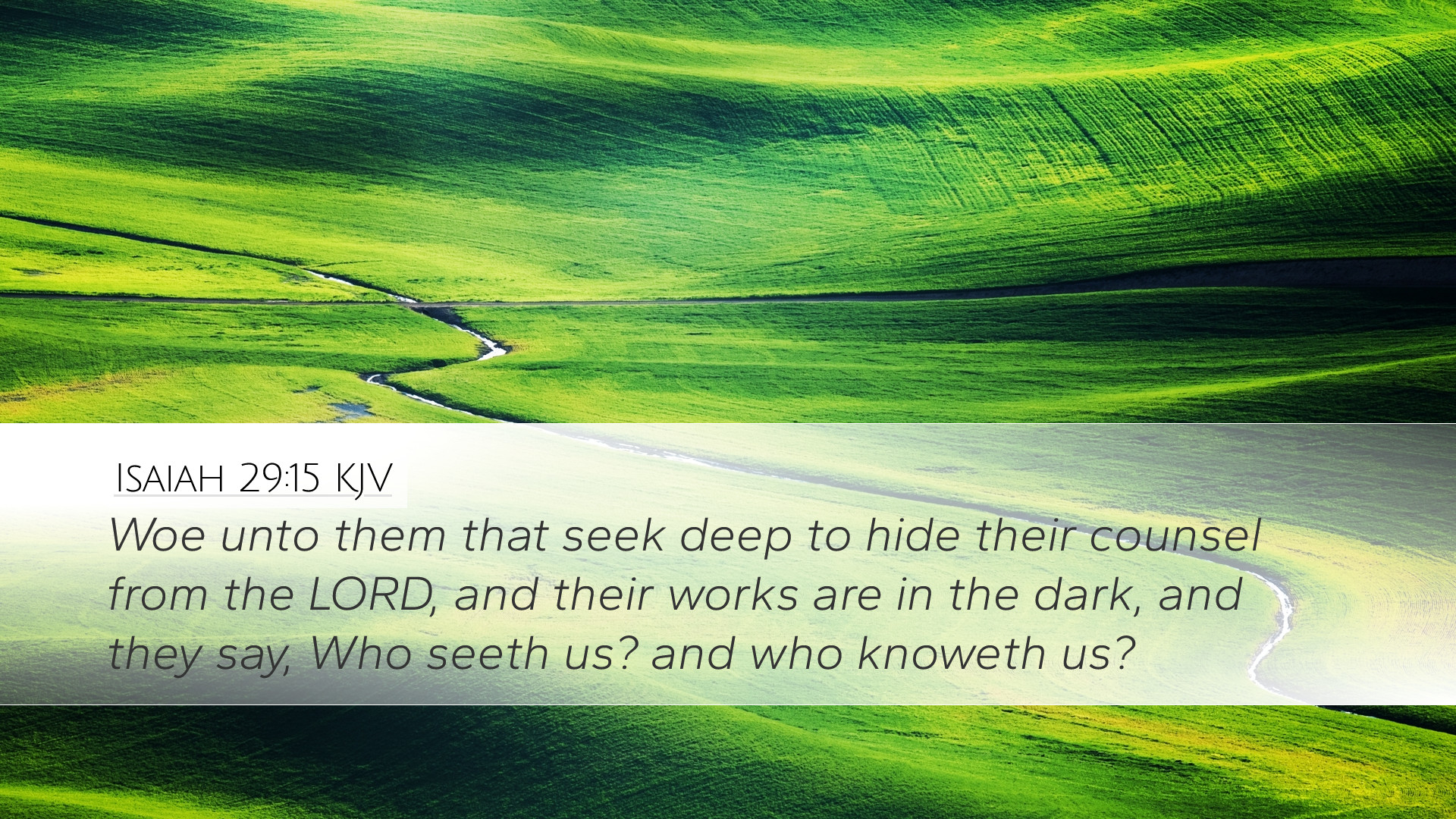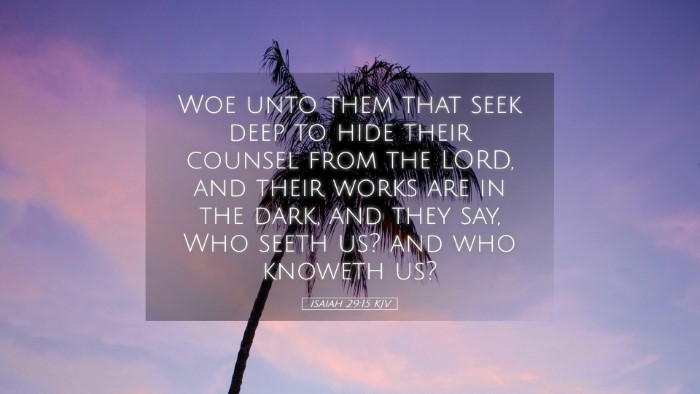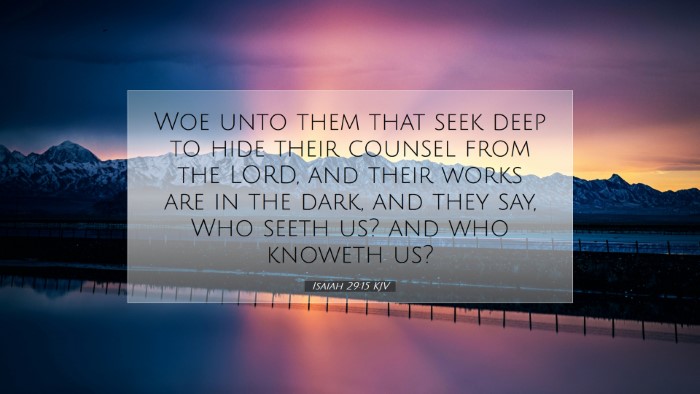Commentary on Isaiah 29:15
Verse: "Woe unto them that seek deep to hide their counsel from the LORD, and their works are in the dark, and they say, Who seeth us? and who knoweth us?" (Isaiah 29:15)
Introduction
This verse captures a profound condemnation of those who attempt to conceal their intentions from God. It illustrates the futility of trying to hide one's actions and plans from the Omniscient Creator. Drawing from the insights of public domain commentators such as Matthew Henry, Albert Barnes, and Adam Clarke, we can explore the layers of meaning found within this single verse.
The Nature of Divine Omniscience
Matthew Henry emphasizes the folly of attempting to hide from God. He notes that such actions stem from a misguided understanding of God's nature. The idea that God does not see or know our deepest intentions is a profound deception that many fall into. He highlights that God's omniscience is absolute, and therefore, all attempts to conceal counsel are ludicrous.
Albert Barnes reinforces this point by discussing the arrogance that accompanies such deceptive thinking. He comments on how those who operate in the darkness often do so with an assumption of invisibility, believing they can escape divine scrutiny. Barnes provides a sobering reminder that God's perception transcends human understanding.
Adam Clarke advocates for a moment of self-examination for the reader, urging them to recognize their own hidden motives. He stresses that the human heart is notoriously deceitful and that striving to mask one's true intentions reveals a profound disconnect from the reality of God's presence and judgment.
The Consequences of Concealment
- Moral Accountability: The passage illustrates a key theological tenet regarding moral responsibility. The concept that “their works are in the dark” serves as a reminder that God’s judgment will ultimately expose the hidden deeds of men.
- Judgment and Wrath: According to Henry, there is an implicit warning about the judgment that awaits those who persist in their dishonesty towards God, illustrating the painful truth that divine justice will prevail irrespective of human attempts to hide.
- Folly and Wisdom: Barnes elucidates the contrasting themes of wisdom and folly, noting that true wisdom recognizes God’s omniscience and adjusts behavior accordingly. The folly of hiding speaks to a deeper moral ignorance.
Contextual Understanding
To fully grasp the implications of Isaiah 29:15, it is crucial to consider its context within the Book of Isaiah. This portion of the scripture addresses the spiritual blindness and rebellion of the people of Israel.
Matthew Henry discusses how this blindness leads to a corrupt understanding of God's word and a disconnection from His will. The seeking of counsel away from God's guidance indicates a broader rejection of divine authority.
Adam Clarke provides historical insights, explaining that the specific circumstances of Israel at the time—through their alliances and idolatrous practices—exemplified a deeper systemic issue of rejecting God's counsel.
Theological Implications
This verse also raises several theological themes relevant for modern readers:
- The Nature of God: Understanding God's omniscience is crucial for shaping a believer's relationship with Him. Acknowledging His all-seeing nature should prompt humility and sincerity in our spiritual lives.
- Revelation and Prayer: Barnes asserts that the notion of seeking counsel entails an active pursuit of God’s will through prayer and biblical revelation, as opposed to the idolization of personal judgment.
- Sin and Redemption: Clarke underscores the importance of confession and repentance, suggesting that the path to redemption is through the acknowledgment of sin, especially those hidden in the dark.
Application for Today's Believer
The relevance of Isaiah 29:15 continues for contemporary believers:
- Transparency with God: This verse invites believers to live lives of transparency, seeking to align actions and intentions with holiness and integrity.
- Community Accountability: The insights also suggest the necessity of community within the church. By sharing struggles and being honest in fellowship, believers can pursue accountability in their walk with Christ.
- Awareness of God’s Presence: Understanding that God sees and knows all can serve as a profound motivator for personal holiness, leading to a more vibrant and sincere faith.
Conclusion
Isaiah 29:15 serves as a penetrating reminder of God’s omniscience and the futility of attempting to hide from Him. Commentators like Matthew Henry, Albert Barnes, and Adam Clarke provide invaluable insights that deepen our understanding of this verse. As pastors, students, and theologians, the call to live in the light of God’s truth remains imperative, impacting Christian practice and community life today.
In seeking to live authentically before God, may we find grace in acknowledging our shortcomings and strength through the power of His redemptive love.


